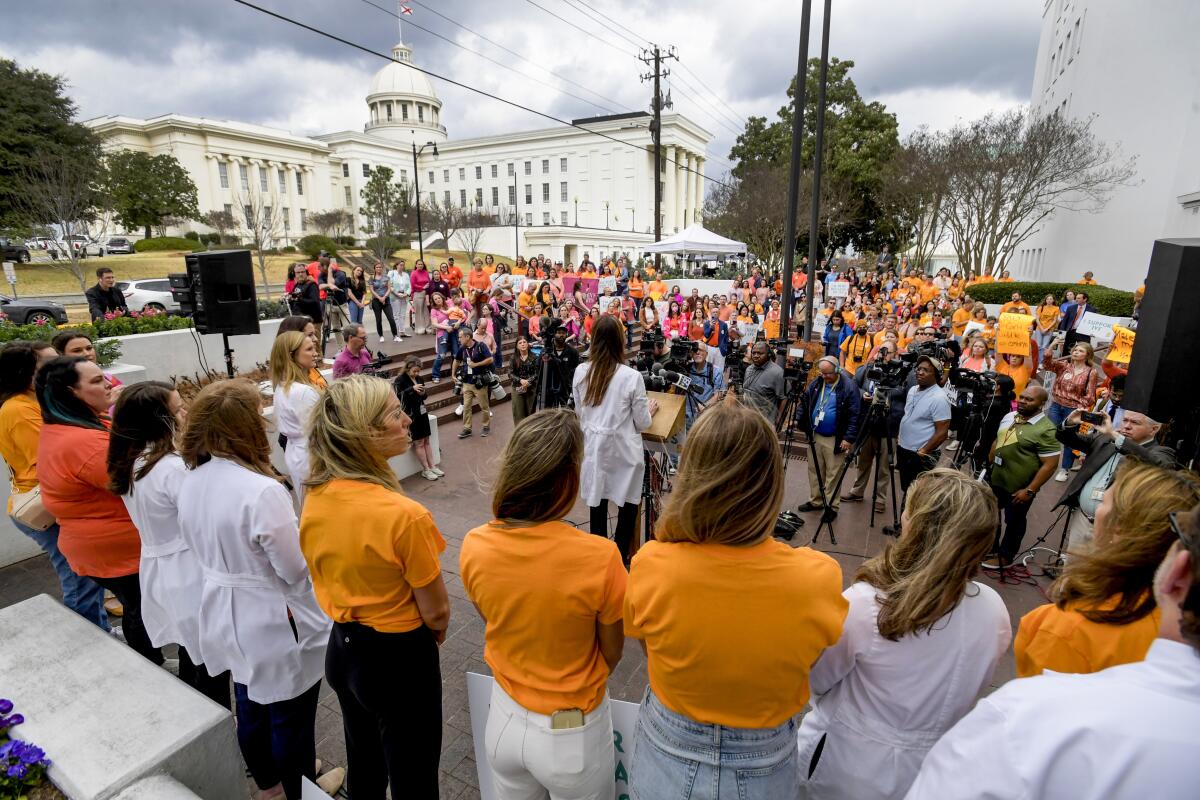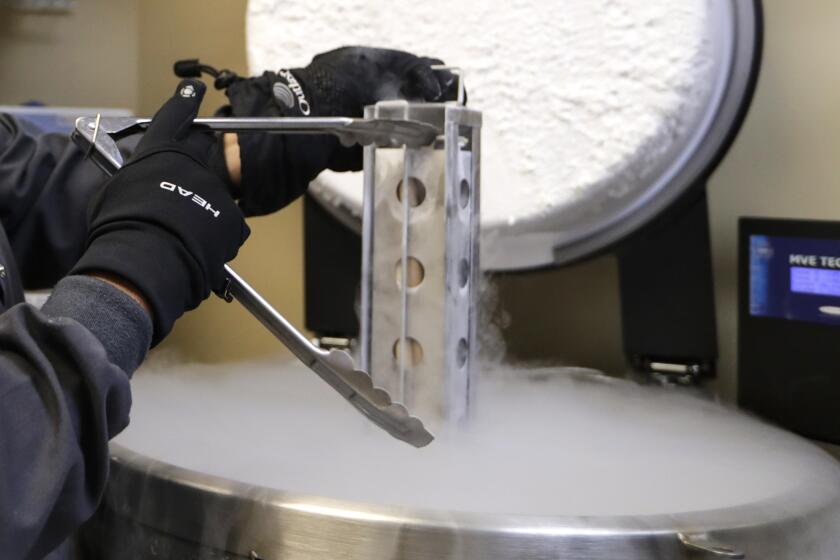Alabama lawmakers advance legislation to protect IVF providers, with final approval still ahead

- Share via
MONTGOMERY, Ala. — Alabama lawmakers facing public pressure to get in vitro fertilization services restarted in the state advanced legislation Tuesday to shield providers from the fallout of a court ruling that equated frozen embryos with children.
Committees in the state Senate and House approved identical bills that would protect providers from lawsuits and criminal prosecution for the “damage or death of an embryo” during IVF services.
The state’s three major IVF providers paused services after the Alabama Supreme Court ruling last month that three couples who had frozen embryos destroyed in an accident at a storage facility could pursue wrongful-death lawsuits for their “extrauterine children.” The ruling, treating an embryo the same as a child or gestating fetus under the wrongful-death statute, raised concerns about civil liabilities for clinics.
The court decision caused an immediate backlash. Patients in Alabama shared stories of having upcoming embryo transfers abruptly canceled and their paths to parenthood put in doubt.
The Alabama Supreme Court says frozen embryos created through IVF are children. Will clinics be required to maintain them forever? Do they have a right to be born?
Lawmakers are aiming to give final approval Wednesday and send the legislation to Gov. Kay Ivey to be signed into law. Lawmakers have fast-tracked the immunity legislation as a proposed solution to get clinics back open as they weigh whether additional action is needed. Republicans in the GOP-dominated Alabama Legislature have shied away from proposals that would address the legal status of embryos created in IVF labs.
Alabama lawmakers are scrambling for ways to protect in vitro fertilization services after the state Supreme Court said frozen embryos can legally be considered children.
Beth and Joshua Davis-Dillard watched as the Senate committee voted. After moving from New York, the couple transferred frozen embryos left over from when they had their twins to Alabama.
“We’ve been working up to getting ready to trying again. We still have embryos from our prior cycle, which we did in New York. We transferred them here. We can’t use them. We’re on hold,” Beth Davis-Dillard said. “I’m 44, so time is limited.”
Beth Davis-Dillard said she feels “very helpless and very frustrated” and in a “little bit of disbelief.” She said that before they transferred the embryos to Alabama, the couple briefly discussed whether the state’s strict abortion ban or political climate could be a problem but presumed it would ultimately be fine.
“It just feels like our rights are being restricted,” she said.
The legislative proposals state that “no action, suit, or criminal prosecution for the damage to or death of an embryo shall be brought or maintained against any individual or entity when providing or receiving services related to in vitro fertilization.”
Civil lawsuits could be pursued against manufacturers of IVF-related goods, such as the nutrient-rich solutions used to grow embryos, but damages would be capped and criminal prosecution would be forbidden. Doctors have expressed concern that without some protections for manufacturers, they will not be able to get the products they need to provide IVF.
The American Society for Reproductive Medicine, a group representing IVF providers across the country, said the legislation does not go far enough.
Sean Tipton, a spokesman for the organization, said Monday that the legislation does not correct the “fundamental problem,” which he said is the court ruling “conflating fertilized eggs with children.”
House Democrats proposed legislation stating that a human embryo outside a uterus cannot be considered an unborn child or human being under state law. Democrats argued that was the most direct way to deal with the issue. Republicans have not brought the proposal up for a vote.
State Republicans are reckoning with an IVF crisis they partly helped create with antiabortion language added to the Alabama Constitution in 2018. The amendment, which was approved by 59% of voters, says it is state policy to recognize the “rights of unborn children.”
The phrase became the basis of the court’s ruling. At the time, supporters said it would allow the state to ban abortion if Roe vs. Wade were overturned, but opponents argued it could establish “personhood” for fertilized eggs.
More to Read
Sign up for Essential California
The most important California stories and recommendations in your inbox every morning.
You may occasionally receive promotional content from the Los Angeles Times.















